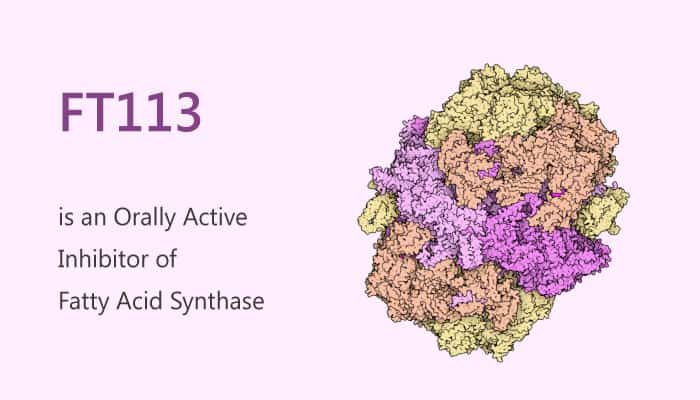Fatty acid synthase (FAS) is a protein responsible for fatty acid synthesis. It mainly catalyzes palmitate synthesis from acetyl-CoA and malonyl-CoA, in the presence of NADPH. FAS gene is reported to be a possible oncogene. Many researches also show that FAS exists high levels in breast cancer. The protein becomes an indicator of poor prognosis. Thus, it is a promising target for cancer therapy.
Herein, we will focus on FT113, a potent fatty acid synthase inhibitor.

FT113 interacts with the potency-driving regions of FAS KR domain binding site. It also exhibits excellent anti-tumor activity.
To begin with, FT113 exhibits potent inhibitory activity against FAS, with an IC50 of 213 nM for full-length recombinant human FAS. It blocks FAS activity in BT474 cells, with an IC50 value of 90 nM.
According to the potent effect on FAS, researchers examined the activity of FT113 in cellular assay. As expected, it suppresses the proliferation of PC3 and MV-411 cells. The corresponding IC50 values are 47 nM and 26 M, respectively.
Since FT113 exhibits excellent activity in vitro, reporters wonder how it functions in vivo. As a result, FT113 proves to be an orally active inhibitor. Moreover, it increases malonyl-CoA concentration in a dose-dependent manner in mice bearing MV-411 cells. Furthermore, FT113 inhibits the growth of tumor by 32 % and 50% at 25 and 50 mg/kg, respectively.
Totally, FT113 is a potent and orally active fatty acid synthase inhibitor, exhibits potent anti-tumor activity.
References:
1. Martin MW, et al. Bioorg Med Chem Lett. 2019 Apr 15;29(8):1001-1006.